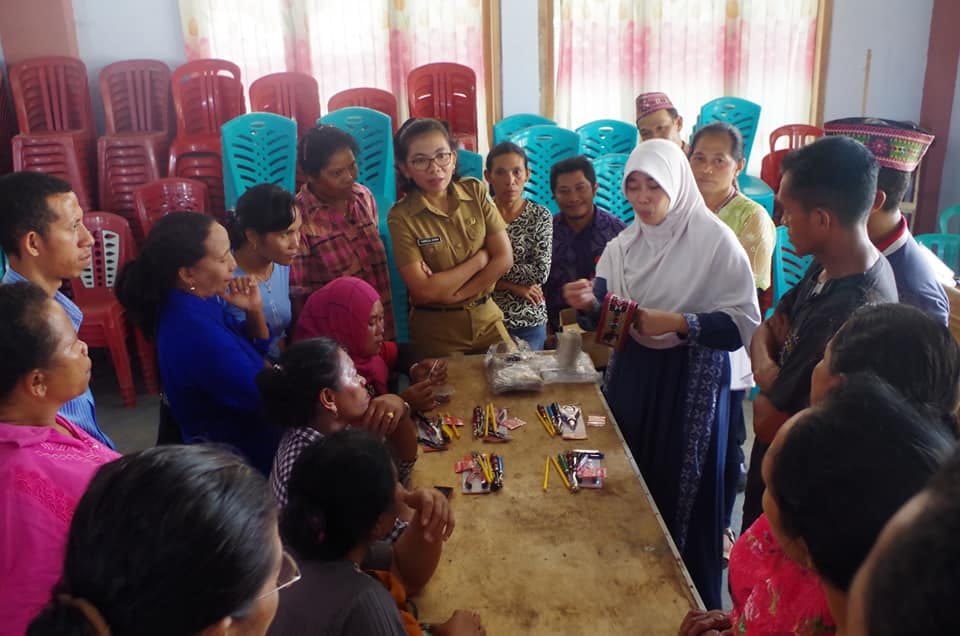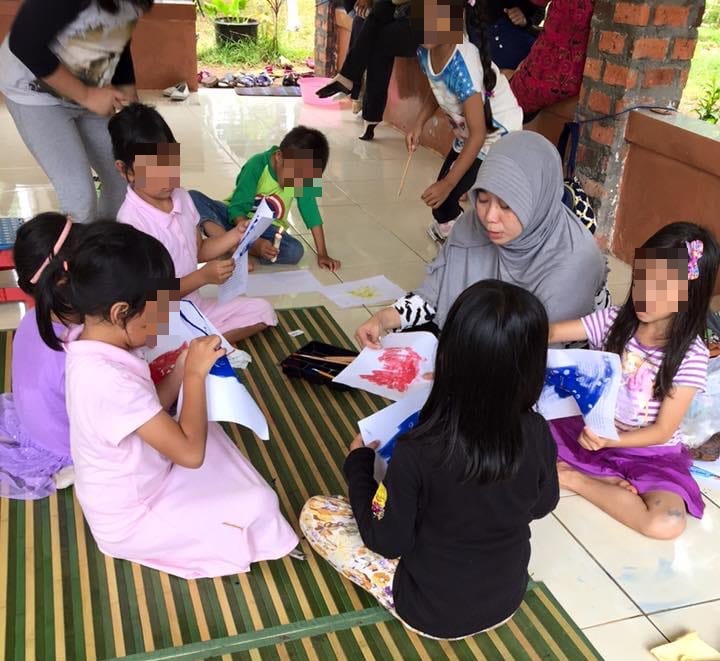Trigger warning: domestic violence, child abuse.
Five-year-old Mia was born deaf and mute. Two years ago, she and her mother escaped the horrors of an abusive household. But COVID-19 compounded their misery.
As the pandemic devastated Indonesia, Mia and her mother Mirna contracted the coronavirus. The toddler survived, but her mother did not. More than just about survival, their story paints a grim picture of the human struggle and their bravery to overcome the odds.
This story really began 20 years ago, when Mirna and her husband migrated from Sorong, West Papua to Jakarta in pursuit of a better life. Neither had any relatives in the capital, and they had no one but each other as they took on the harsh and often unforgiving life in the big city.
Making ends meet, Mirna found work as a waitress in a restaurant, while her husband drove trucks between major islands.
Nobody wants to end up in a safe house for domestic abuse survivors, but Mirna’s abusive husband eventually drove her to one.
Light in the dark
Rumah Bulan (Moon House), a community that provides a safe house for survivors of domestic abuse in Depok, West Java, became the place where Mirna found refuge. In an interview with the community, she revealed how her husband was abusive toward her. The mistreatment started with verbal attacks.
However, as these things often do, it escalated.
The physical abuse started when Mia was born. Rumah Bulan director Mitsalina Adani said Mirna suspected that the beatings were triggered by her husband’s frequent drug use and losing his job. He even sold their furniture to feed his narcotics habit.
I can only wish for Mia to grow as a healthy child, as a strong, independent and loving person
Mia and Mirna were spared further horror when he was arrested in 2019 and sentenced to three years in prison for domestic abuse. The mother and daughter first found refuge in a mosque in Pejaten, South Jakarta, but two days into taking shelter at the house of worship, they were picked up by Rumah Bulan, who received a tip from local residents.
On top of providing a safe house, Rumah Bulan also provides legal assistance, psychological help, and training skills for survivors. There are currently around 75 families under Rumah Bulan’s supervision. Despite the need for more personnel, the community only counts on four volunteers — two of whom are domestic abuse survivors themselves — to assist at the facility.
The long road to recovery
Mia and Mirna had scars and bruises throughout their bodies when they were found. Cigarette burns were found not only on the mother, but also on the little girl.
Mirna once recounted with vivid detail life in the hellish household. She said everytime Mia cried, her father slapped her with a clothes hanger or a belt. Mirna had only nine fingers, as her husband severed her right pinkie in a fit of rage. Amid the frequent beatings dished out to both mother and daughter, he had shaved off Mirna’s hair to humiliate her.
The trauma endured even when they were safe at Rumah Bulan.
When they first arrived at the safe house, Mia and Mirna had been quiet. At the sight of an adult male, the then-two-year-old Mia occasionally soiled herself, which spoke volumes about the extent of her psychological trauma. The child never left her mother’s side.
“At first, Mia and Mirna were very introverted. Sometimes they spent their time alone in their room for the whole day. It was like this during the first three months. So, a psychologist came to them,” Mitsalina said.
After being provided with psychological help for a year, both started to show signs of healing from their trauma. Rumah Bulan’s supportive environment evidently helped create a safe space for the pair to grow out of their trauma.

Mirna brought with her a talent for cooking, which came into good use as she eventually gave lessons for other survivors at Rumah Bulan, along with her growing confidence. Meanwhile, Mia began to attend early childhood school after two years in the safe house, learning sign language and playing with her peers.
Further grief
As inopportune as it was for people around the world, the pandemic struck and swept through Indonesia. Mia and Mirna were among the millions who contracted the coronavirus.
Mia survived, but her mother passed away as a result of the disease. When Mia heard about her mother’s passing, she had no response; the five-year-old was unable to process the most devastating grief she had experienced in her young life.
On her deathbed, Mirna said she endured years of pain and was intent on surviving the domestic abuse all for the sake of Mia. To Mirna, Mia was a gift in an otherwise harsh life. Mia’s birth, after all, was an unlikely one. Mirna was told she was infertile due to an ovarian cyst. Yet she gave birth to her precious daughter when she was 39.
This time, though, it was almost as if Mirna felt assured that Mia would be in safe hands should she have to leave her baby behind.
“If I don’t survive, I entrust Mia to you. I ask for your help to keep Mia away from my husband. Don’t let Mia get hurt again. I can only wish for Mia to grow as a healthy child, as a strong, independent and loving person,” she told Mitsalina in their final conversation.
When she lost a friend in Mirna, Mitsalina kept her promise and took Mia under her care. She’ll do all she can to give Mia the life she deserves, but reserves some concern for the possibility of the girl’s past catching up to her. For now, though, her father is behind bars, and it’s unlikely that he will want to claim her when he gets out.
The pandemic also hit Rumah Bulan hard, with available funds only expected to keep the safe house afloat until December 2021. It’s an operation that has heavily relied on public donations and the generosity of volunteers, who do around half of the work and chores around the house. Yet the safe house costs between IDR45-60 million (US$3,163-4,218) per month to run, which is steep at a time when donations have dried up amid a universal financial struggle during the ongoing public health crisis.
Mitsalina, who works as a freelance sustainability consultant, donates between 10-20 percent of her salary toward Rumah Bulan.
“What drives me to keep doing what I do in Rumah Bulan is to see how thankful and grateful the families are when we help them… There are a lot of moments for which I am very grateful,” she said, holding back her tears.
Mitsalina said she will not neglect Mia and other survivors at Rumah Bulan should the safe house have to shut for good. On top of that, she says she will strive to provide and care for her son as a single mother, all the while beginning her breast cancer treatment.
Mirna’s last message to Mitsalina will always spur her on to help those who need it the most: “What I have right now, a good life and a healthy Mia, is because of Rumah Bulan. I will never forget to be grateful. God sent me [the Rumah Bulan volunteers] who love Mia and myself like their own family.”
If you want to help domestic abuse survivors and keep Rumah Bulan afloat, please consider donating through this crowdfunding campaign.







Reader Interactions